"It is always wise to look ahead, but difficult to look further than you can see." -Winston Churchill
We've come a long way in this Universe. Over the past 13.7 billion years, we've formed the light elements out of a sea of protons and neutrons, cooled and expanded to form neutral atoms for the first time, gravitationally collapsed hydrogen and helium gas clouds to form the first stars, borne witness to generations of stellar deaths and rebirths, lived through the formation of hundreds of billions of galaxies and the clustering together of thousands or more galaxies into clusters, filaments, and superclusters.
At the end of all this, at the present time, we find ourselves tucked away in a large but unremarkable spiral galaxy, the second largest one in our local group, more than 50 million light years from the nearest large cluster, in a Universe filled with over 100 billion large galaxies, ranging from just a few million to many tens of billions of light years away.
But although 13.7 billion years is a long time, it's just the early stages of a Universe that's going to be around for a very long time indeed. Thanks to our understanding of physics, astronomy, and the Universe as a whole, I'd like to leap 100 billion years into the future, when the Universe is many times its current age.
The Sun will be long dead, having burned out the very last of its nuclear fuel some 93 billion years earlier, having blown off its outer (mostly hydrogen) layers in a short-lived planetary nebula, while the inner (carbon, oxygen and heavier) layers contract down to form a white dwarf. Although eventually this white dwarf will lose its heat and cool off, becoming a black dwarf, that will not have happened after only 100 billion years. Our Earth, unfortunately, will be just a barren, lifeless rock, if it survives our Sun's death at all.
Our galaxy will also look very different. Rather than the great spiral structure it currently exhibits, with its disk and its spiral arms, its big sister Andromeda, and the many dwarf satellite galaxies populating our local group, the irresistible gravitational force will eventually bring us all together.
The first few billion years of the merger will cause intense star formation initially, turning both galaxies blue with hot, young stars. But those stars don't live very long. After multiple new generation of stars are born, go supernova, die, and trigger the formation of still newer stars, we will be mostly out of unburned hydrogen gas.
But even this is not terribly different from the sky we have today. Sure, the stellar population will be skewed to be lower in mass, the galaxy dominating the night sky will be more massive and shaped differently, and the vast majority of light we receive will be red and infrared light, rather than the ultraviolet-visible-infrared mix we see today. Stellar corpses -- white dwarfs, black holes and neutron stars -- will be far more abundant than they are today, but all of these things still exist today.
The big difference, however, will come when we look out beyond our galaxy.
Instead of clusters and superclusters of galaxies, there will be... nothing. Dark energy will take care of that, driving all the other galaxies in the Universe, everything that isn't bound to our local group, our beyond our visible horizon. If we were born on a habitable planet 100 billion years from now, we'd conclude we were the only galaxy in the Universe.
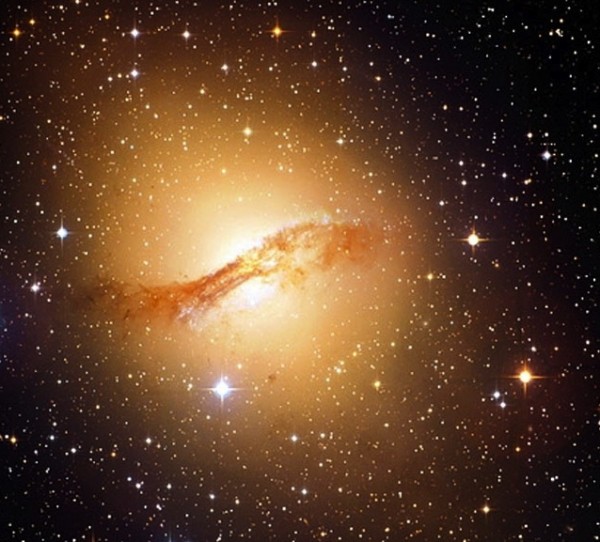
Image credit: Jean-Charles Cuillandre (CFHT) & Giovanni Anselmi (Coelum Astronomia), Hawaiian Starlight.
Even the leftover glow from the Big Bang would be undetectable!
100 billion years would shift the cosmic microwave background far into radio wavelengths, and dilute the density of photons so severely that it would take a radio telescope the size of Earth in order to observe it!
How fortunate we are to exist when the Universe is still young: when new, blue stars are abundant, when the sky is full of galaxies and clusters, when dark energy has only begun to take over the Universe, and when the leftover glow from the Big Bang is still hanging around in the microwave.
Only by chance did we arise here and now; a hundred billion years from now, many of our bodies atoms will be a part of different stars and solar systems, joined together with atoms that aren't even a part of our galaxy today.
Our Sun will be long gone, having died like the nebula above more than 90 billion years in the past, but the matter and energy from our Solar System continues throughout the Universe.
And that's the future of each and every one of us, so don't miss out on today!

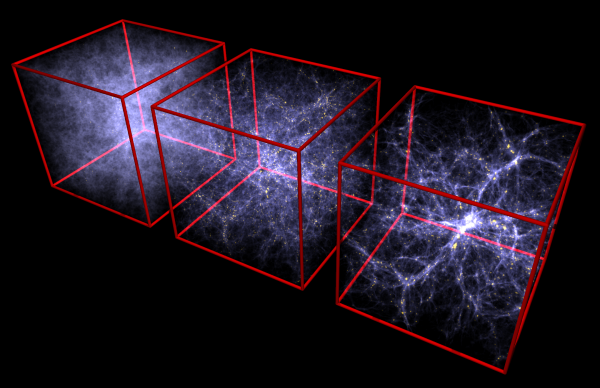
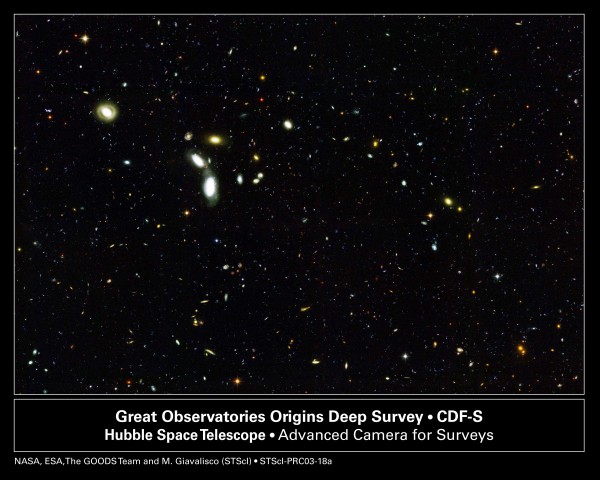

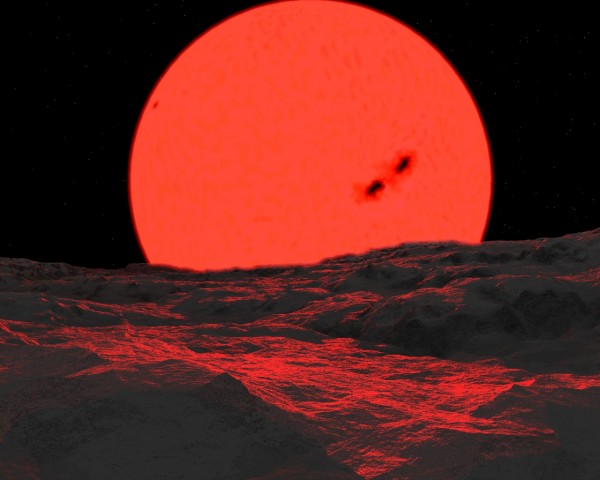
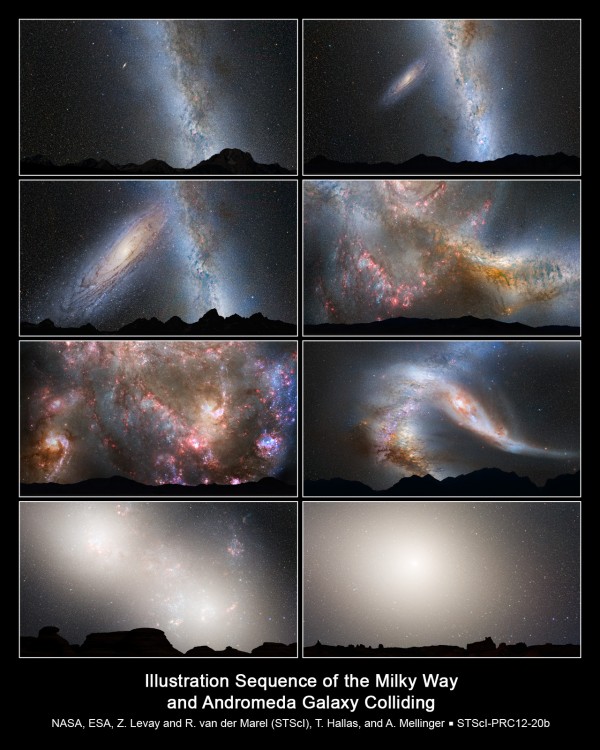
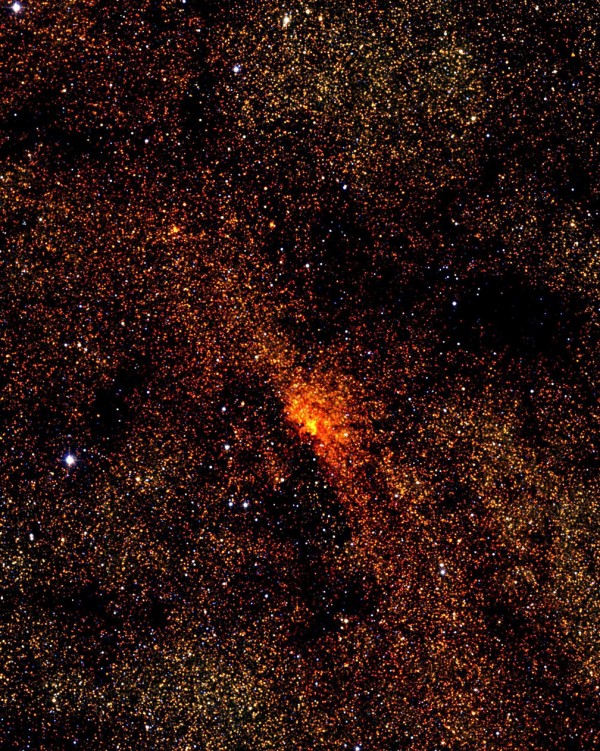
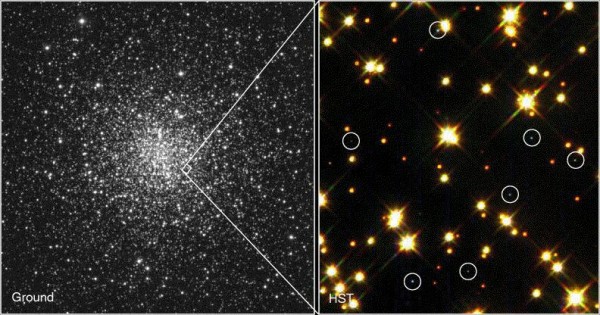
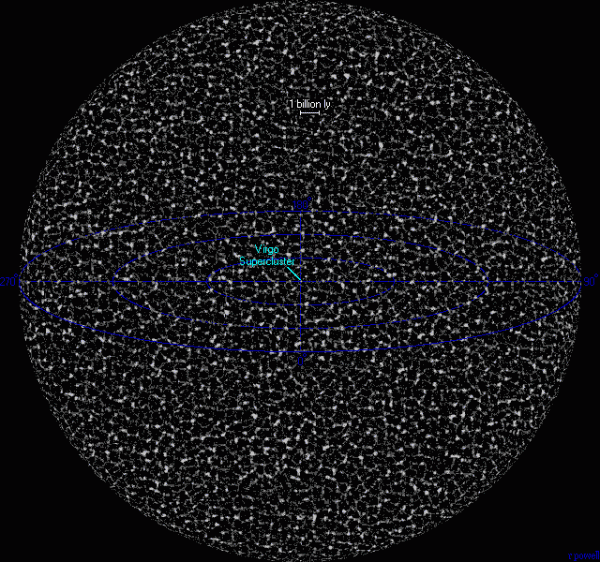
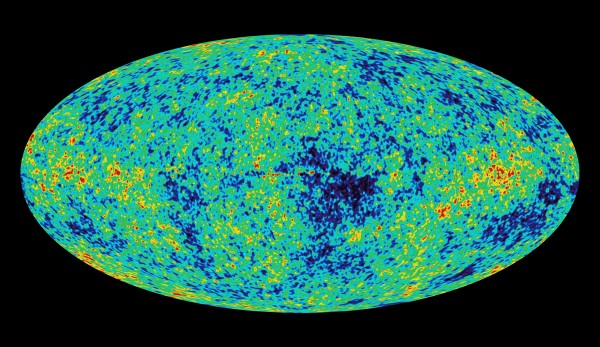
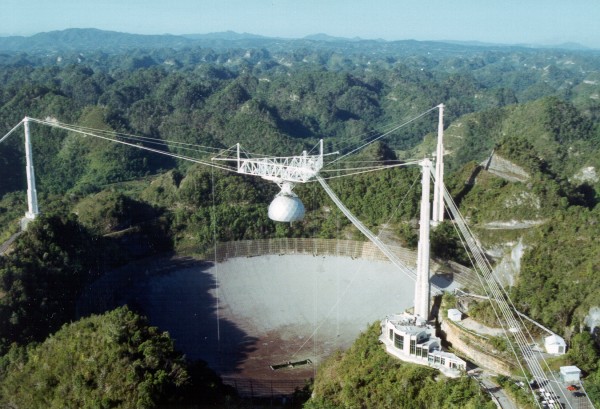
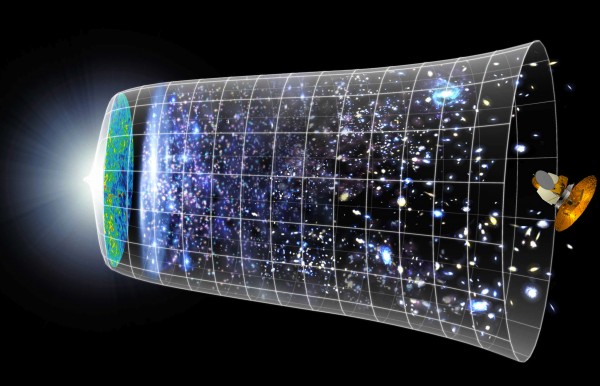
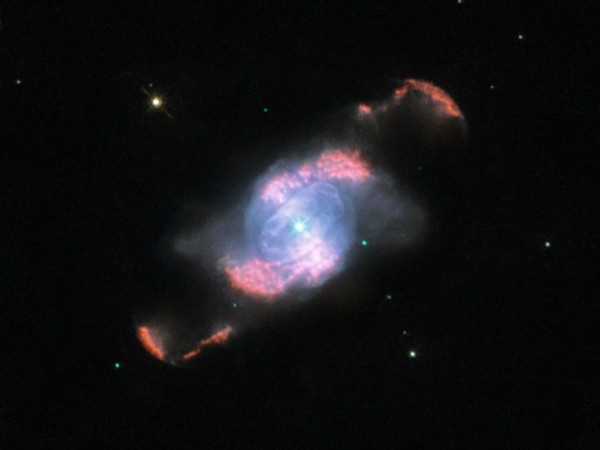
This is a bleak perspective:
But stars ejected out of the galaxy by way of the still existing SMBH would still permit an observer to reconstruct standard cosmology IIRC (likely an arxiv paper; still), DM and DE both.
Presumably they can then predict that they are the only galaxy remaining in the _observable_ Universe.
If not eternal inflation is a fact, because it predicts the cosmic coincidence , us living when DE starts to dominate.
Since inflation seems to be a fact, even if the jury is still out on eternal inflation, I tend to think that this is a reasonable hypothesis at the moment.
I find that elliptical 'Aitoff-projection' image of the CMB around us a bit misleading, as it is an artificial composition of the 'flat' sky around us, and not so much like similar maps of Earth which is an actual spherical/round object. Having that said there is a much better option to look at it and that's by watching it on Google Earth with the Sky option. For those who don't know, you can download the 7 year map for that application from NASA's LAMBDA site.
What's cool is that you can zoom in and out, and you can sweep animate the 'view' and when you do so, the cycle starts to look like a Bubbling-Boiling-Quantum-Soup.
I took a short screenshot of it so you can check it out, and you'll also need to 'loop' play it to see the *effect*
http://tinyurl.com/boiling-mov (1.6 Mb - right click 2 download)
Anyway, what I would like know is, if it is 'statically' losing temperature like you suggest; "Even the leftover glow from the Big Bang would be undetectable!" or could the temperatures actually be fluctuating around, changing temperature at each spot; and if so, could it suggest that it is something active rather than a footprint … ?
"and not so much like similar maps of Earth which is an actual spherical/round object"
Oblate spheroid, you mean.
And aren't those similar maps an artificial composition of the 'flat' earth beneath us?
So what, then, is the difference that makes you accept one but not the other?
And why do you insist on asking "is it possible" questions that are little more than "is it possible that I will be crushed to death by falling hippopotomi by tuesday 3pm?"?
The answer would be "no" except for patently worthless values of "yes".
Most likely, the universe is both infinite and eternal - just not in the form we know it today. The author's prognostications are extrapolated from the universe we know ... or think we know.
"So what, then, is the difference that makes you accept one but not the other?"
We are sure about the shape of the Globe that we live on, but not of what is out there. It creates the impression that the Universe is one giant (expanding) bubble, while we are actually looking at it from within our own bubble.
"We are sure about the shape of the Globe that we live on"
You weren't. You thought it was a sphere.
That also is NOT a reason to say the projection is wrong.
"It creates the impression that the Universe is one giant (expanding) bubble"
Well, no. No more than a mercator projection creates the impression that the earth is one giant sphere.
"while we are actually looking at it from within our own bubble."
What bubble? You seem to have a little bubble world of your own, but that's your problem.
"Most likely, the universe is both infinite and eternal – just not in the form we know it today."
So it was a form smaller than today in the past. Just like the big bag theory says. That's not a form we know it to be today, right. Therefore it fits your proclamation.
"or think we know."
Or think that you know that they don't know.
Your knowledge could be wrong. It doesn't look as though it was infinite nor does it appear to have been eternal. Do you know different?
"Where will we all be in 100 billion years?" is kind of like "Where will the continent of North America be in 100 billion years". I'm sure the geologist have a mathematical model; but they don't have the hubris to answer such a question seriously.
The problem with a 100 billion year prediction about the universe is that it necessarily assumes a great many things that we currently assume to be true that will be shown to be false.
We need to understand quantum gravity, dark energy, dark matter etc; we need a lot more observation and experiment. After another 100 years of new theory and observation; maybe humans will be cured of the hubris of prediction the next 100 billion years or even the next 100 years of physics.
.
I mean we don't spend $300 million on LISA or LIGO just to find out what general relativity theory predicts; we want to discover something new.http://arxiv.org/pdf/1012.1109v1.pdf "Gravitational-wave astronomy promises to shed light on the “dark side” of the Universe. Because of their strong gravity, black holes and neutron stars are ideal sources and we hope to probe the extreme physics associated with them... Eventually, observations (gravitational and electromagnetic) will help us understand many aspects of extreme physics that seem mysterious to us today. The next decade will see significant improvements in the various observational channels, and we should expect great progress in our understanding of the Universe." let me emphasize "GREAT PROGRESS"
ditto the James Webb Space Telescope, the Large Hadron Collider, etc..
If theory was that good we wouldn't need crash test dummies to test the classical mechanics of automobile collisions.
Disclaimer: I am just a crash test dummy.
How refreshing. A good start to the weekend. ;-)
WRONG!
THE UNIVERSE IS ABOUT 6000 YEARS OLD WE KNOW THIS BECAUSE JESUS CHRIST OUR SAVIOR TOLD US.
AND ALL THESE "SCEINTISTS" CLAIM TO BE WISE AND HAVE THE KNOWLEDGE OF GOD HIMSELF!
THAT IS CALLED IDOLITRY AND IT IS SINFUL AND WRONG!
JESUS WILL COME BACK SOON AND HISTORY WILL THEN END AND ALL THIS NONSENSE ABOUT 100 BILLION YEARS WILL BE SWEPT AWAY AS WE WILL BE IN HEAVEN!!!!!!
“Where will we all be in 100 billion years?” is kind of like “Where will the continent of North America be in 100 billion years”. I’m sure the geologist have a mathematical model; but they don’t have the hubris to answer such a question seriously.
Um, I'd expect any geology STUDENT who actually read their first-year textbooks attentively would be able to answer that question: North America will not exist 100 billion years from now, precisely because of the solar life cycle described in this post.
What if the speed of gravitational force is infinite, time is effected by mass and relative to the current speed of light photons born in the future travel faster than those born yesterday?
"We need to understand quantum gravity, dark energy, dark matter etc; we need a lot more observation and experiment"
We've done that.
You may have missed it....
What you *can* say about it is that it is contingent on what we understand about [those things] being broadly correct.
"THAT IS CALLED IDOLITRY AND IT IS SINFUL AND WRONG!"
No, that's worshipping graven images. Which means that statue of the dude nailed to a dod of wood at the back of your church is sinful and wrong.
birdfish,
I have trouble differentiating between people on the internet who make sarcastic posts making fun of fundamentalist religious people and actual fundamentalist religious people making BS posts. I will assume that you are serious, and my apologies if you aren't.
1. When exactly did Jesus say "the universe is 6000 years old?" Where exactly does it even say so in the Bible? (Those are two different questions, BTW). I would assume that if Jesus actually said this, it would appear somewhere in the Gospels, since this pretty much is the only real record that we have about what Jesus actually said. I'm not really a Biblical expert, but I do have some knowledge, and I don't recall ever seeing anything in the Gospels about the age of the universe. Please enlighten me then, what chapter and verse are you thinking of here.
Further, I am quite certain that no actual number for the age of the earth is specified in Genesis either. Your 6000 years probably refers to a calculation made several centuries ago (sorry, I can't remember who did it off the top of my head). However, that was a calculation based on that person's own interpretation of the Scripture, not a number that actually appeared anywhere in the Bible. So again, if I'm wrong, enlighten me; which chapter and verse is it that says that the universe is 6000 years old?
I must assume that you believe in a literalist interpretation of the Bible. However, other interpretations abound, and there's no objective way to determine which one is correct. It seems to me, however, that the literal one is the LEAST likely to be correct. All kinds of contradictions exist between known mathematical and scientific facts and a literal reading of the BIble. For instance, if read literally, pi must have a value of 3, the earth must be a disk rather than a sphere, and bats must be birds rather than mammals. If, despite this, you want to believe that the Bible is literally true, fine, go right ahead. Don't try to argue this point of view on a SCIENCE blog, however. You won't gain any traction here with those ideas.
@Wow refering to Chelle
I think you are reading a bit too much into his/her post. I will give Chelle credit that using a 3d program such as Google Earth at least helps me spatially comprehend these maps. Much in the same way I hate viewing fish-eye images. I know the basics behind it, but for me it just doesn't click right away.
I was a bit thrown off by the bubble in a bubble argument but meh.
More generaly, don't get caught up in arguments over trivial things like sphere vs. oblate spheroid. You are correct but considering this is just a comments section on a blog, something that is 99% a sphere is ok to call a sphere haha. I'm all for being a dick at times but this has been one of the few blogs/boards that isn't full of regulars that smite everything that isn't perfect. I've seen you post on here and you are normally not but I don't want to see other people discouraged to post on here thinking they are going to be chastized.
@Chelle
As for the active vs. footprint question, yes the temperature fluctuations are active but the average of those would be the footprint. So as Ethan stated we would not be able to detect the CMB in 100 billion years because the footprint or average has dropped to such a low number. There will still be fluctuations but given the average is much lower, the degree in fluctuations will also be much lower. Kind of like a pot of water, the greater detail you look at it you will see fluctuations but there will still be an overall average that will decrease with time.
@Wow
Ok you can be a dick to birdfish lol
birdfish,
To continue: (hit submit too quick, sorry)
2. When exactly have scientists claimed to "have the knowledge of God himself"? I realize, (but I'm not sure that you do) that not all scientists are atheists. However, whatever the personal beliefs of the scientists are, God plays no role whatsoever in sciences. Not all scientists are atheists, but science is an atheistic process. Science relies on methodological naturalism in order to proceed. Basically, this is a realization that science cannot deal with anything other than natural phenomena. Supernatural phenomena (assuming that such exist) cannot be dealt with by science. Therefore, science must proceed without reference to God. The question of whether God exists, let alone any knowledge that He hypothetically possesses, is totally unaswerable by science.
I think the problem you have is that science is investigating things that you would prefer that science does not investigate. If your faith in God is strong, this should not bother you. Only if such investigation challenges your faith should you be concerned. Scientists care not about matters of faith. If scientific investigation causes you to question your faith, then too bad for you. If not, then please leave science alone; it has nothing to do with your faith.
"@Wow refering to Chelle
I think you are reading a bit too much into his/her post"
Then you've not read her posts before. She's an anti-science idiot who keeps bleating on and whining about how EVERY OTHER SCIENTIST has ***EVERYTHING*** (and I'm not exagerating here) WRONG.
Whined on and on about "tired light". Keeps yomping on about the aether. Insists that the universe is one huge hurricane like gyre. That gravity doesn't exist and that ALL science is done by nazi child killing monsters.
Really.
Not making this up.
Have a look at chelle's insanity over in the "With All The Suffering in the World..." thread on SWAB.
It wasn't the early stages by a long long LONG chalk.
Cody Lawson,
"yes the temperature fluctuations are active but the average of those would be the footprint."
mh, to be more precise, my question is, if those fluctuations keep on having the same frequency, than they are not fading away, even when the average is going down. What I mean is, for instance when you play some music, and the overall sound is suddenly a lot dimmer, but you can still hear the beat going stron (at the same pace), than you know that the band isn't slowing down, but that there might be a fly in your ear, or someone has turned down the speakers.
Cody, enjoy the feeling of your brain turning to mush as you try to work out with chelle what the hell she means.
@Wow
I officially rescind my comment haha. I just saw the Google Earth stuff so gave her the benefit of the doubt.
Back in college (was a government major and almost a classical civilizations major, just a huge astronomy nerd) I used Google Earth in a project to layer 3d battle formations to scale with the local topography. It's amazing the different perspective you get from seeing actual triremes in formation versus a large black triangle that says "triremes" on a drawn map. The program has huge potential as a means of teaching to new students. Plus it's just freaking cool.
So yea a bit of bias and nostalgia came up when I saw her refering to it. As for her ideas, yea that kind of stuff should be chastized. You can only argue with a pole for so long.
@Chelle
The fluctuations will also diminish as the average diminishes. If something is 100 degrees for example, seeing the temperature fluxuate within a couple percent, or degrees since we are using 100 as our base temp, would be entirely normal. As it got colder (into the CMB range) and the overall energy of the particles nears absolute zero, there simple is not enough energy for those fluctuations to occur at their previous level. You are now talking about fluctuations that or more like +/- .000002 versus +/- 2.
The band analogy just wont work. If you wanted to go that route it would be more along the lines of the drummer keeping a stead beat but slowly plays quieter due to fatigue. He will eventually hit a point where he can only exude 10% hit strength +/- 2 or so percent versus at 100% hitting with a +/-10% variation.
Does that make more sense?
Cody Lawson,
Read my comment at August 9, 7:01 pm at that topic that 'Wow' suggested, you are a good sheep, meh meh :mrgreen:
Thing is, I will make idle speculation that probably is completely wrong and don't put much thought into working it out myself. I.e. "Do photons self-gravitate, and if so, how do the gravitons exchange between two such photons?" or "Is Dark Energy produced by the Mass-Energy disappearing into a black hole singularity going through the extra dimensions and being sputtered throughout our 3D space?"
But unlike chelle, I don't think it any more than idle speculation or a little intellectual diversion.
She seems unable to drop the idea that she is somehow a Modern Gallileo and EVERYONE else is The Inquisition.
Chelle:
Got that Aether engine working yet? I know a guy at GE who said it could be the future of clean energy.
Yep, that makes perfect sense, thanks.
... and sorry for the meh-thing, I thought you gave up after Wow's intervention.
@Wow
I never got to reply back on the "colors" thread about averted vision. I was actually just sitting here imagining I was looking through an EP to see which direction I naturally gravitate towards. If memory serves me correct, I almost always go horizontally towards the nose about 1/3 of the FOV's radius. I will then bounce between about 1:30 and 4:30 (clock face) for the vertical axis. I have always wandered how far away one should technically look. But for just trial and error, that method has worked pretty well up.
I unfortunately have a dob so go-to is out of the question until I buy a stellarcat or platform. But the Explore Scientific 100 degree 14 will give you plenty of time to play with most objects. Seeing as how I am in Cygnus with the Carbon stars I am going to have to give the Blinking Planetary another look. Hell in two weeks it will be even more awesome since I will be back out at Okie-Tex!
The celestron SkyScout can be attached by a whitworth thread to your dob to give you a "push-to" scope.
You'll still need to learn a bit of star-hopping because your accuracy sill still require a fairly large field of view to keep your actual target in the FOV when "on target", from there you'll need to hop to the actual spot using the stars and go up a few eyepieces.
Alternatively, you can get a cheap Skywatcher/Celestron GOTO mount and scope for only a little more. A mak should give you good magnification and you don't really need light grasp for planetaries that warrant a high mag.
"...a hundred billion years from now, many of our bodies atoms will be a part of different stars and solar systems..." There is poetry in this.
@ Wow
Don't worry been doing this for a couple of years :) I almost dislike the Go-To scope simply because it takes the "hunt" out of it. It would be handy for planetary viewing but that's for tracking, not just finding.
I do at least appreciate the technology on the passive end. I originally used both a Rigel and a finder scope to hone in on targets, not too mention big ass star maps. I eventually got decent enough to ditch the finder scope. Then I figured out I could just pull up Sky Safari Pro and Sky Tools 3 to build my own charts with the limiting magnitude of that night's conditions and EP FOV's. Couple on a green laser and the Rigel even becomes useless.
So now I just sit back leisurely with my iphone's charts and casually push the scope to the location without breaking my back looking through different finders. You just gotta watch out for airplanes and keep your phone as dark & red as possible.
What kind of scope do you have? I got a 12" LightBridge but have practically replaced everything except the tube. I am actually in the middle of building a new rocker box. Heavy dew and particle board are not friends...
I might believe it, but are you not the same guy who a few months ago went on and on about man made global warming?
Universal warming? Maybe cooling this time 'round.
8" F5 Newt. 180mm Mak. 72mm Doubet APO. Two GEM tripods, one with full GOTO and one with just a RA motor.
Problem with the Newt is I'm not tall and looking through the scope on tippy-toe isn't secure or pleasant.
Try linseed oil on the particle board then wax over that.
Why asked such superfluous question "Where will we all be in 100 billion years?" when we can't even know exactly where will we all be in 1 thousand years?
While scientists can be extraordinary imaginative (often beyond words), it would be better to spend more time in doing some down-to-earth and realistic stuff to ensure that we will still be around in 100 years. (btt1943)
Ahem....
Blah blah blah blah.
I just had to weigh in.
Thanks
Sad to think a time will come when the brightest scientists in the universe will never know even the little we now know.
So, with nearly every other remote galaxy disappearing from our ken, will the ratio of Invisible Dark Matter to Baryonic Matter be maintained at 5:1 in the part of the universe visible to our remote descendants?
If not, what will this mean for the rotation curve of the remaining giant galaxy formed by the melding of the Local Group if there is less DM in the surrounding galactic halo to exert a gravitational "pull" on the galactic remnants?
"when we can’t even know exactly where will we all be in 1 thousand years?"
We will all be dead in a thousand years.
Unless someone invents in the lifetime of someone alive today an elixir of eternal life.
So we can say something.
It's interesting to think of the problem that newly born intelligent species would face after the big merger and the receding universe. As no light can get to us from the neighboring galaxies, their image of the _entire_ universe will be that of before Hubble. The universe will be limited to the coming super-galaxy. It'll be large for sure, but it won't give even the impression of infinity. And it is quite unlikely that they would even bother to hypothesize the CMB as it would be just too resource expensive to prove, an antenna the size of a planet.
As a consequence, the idea of dark matter will not occur to them for long, long, long time because it will take many more 100 billion years to observe the effect of the universal inflation in place packed with gravity on interstellar scale. This idea would make a fine base line for a sci-fi novel I guess...
dark energy, I mean...
In my honest and humble opinion...
Speculation about what life will be like, even 100 years from today and being accurate in your prediction, is about as difficult as throwing a baseball into a one metre sized hole....one hundred metres away... (certainly possible, but I would guess that there are more misses than hits, depending on who's throwing the ball).
As regards predicting things for a hundred billion years from now..hehehe...
My calculator ran out of spaces for calculating the odds of accuracy (actually, I don't own a calculator)... Let's just say they are so close to zero (for having even ONE prediction right) that I would venture calling it a mathematical zero.
Considering the "facts"
(May I steal a quote here... "Before one can truly gain an understanding of human evolution and modern human variability, a background in both the history of evolutionary thought and the principles that underlie its application is in order.")
Considering that the human race, in our current evolutionary stage, is only about 200 000 years old, our brains still not even at 10% of capacity, I would hope that any serious predictions about the future (relatively speaking) should be possible in about another 2 million years....After all "Evolution is hardly a thing of the past"
On the brighter side...
This thread does support recent "controversial" theories about human intelligence declining and being contrary to the Flynn Effect.
Can I take my tongue out of my cheek now sir?
That 10% is a bit of old bollocks, there.
A similarly bollocks example is noting the fact that if all our muscies could pull together, the average human could deadlift 25 tons and then concluding that because the deadlift record is 1/2 a ton, therefore humans use 2% of their muscles.
Erratum and Addendum
(Thank you Wikipedia)...The timeline of human evolution spans approximately 7 million years, from the separation of the Pan genus until the emergence of behavioural modernity by 50,000 years ago. ... The above figure of 200 000 years was based on my own opinion.
Note to self:
Start work on your Yottaseconds watch design, we only have 6.616×10(to the power of 50) Yottaseconds before nothingness!...or the Bolzmann brain...
@WOW
You forgot to add ... In YOUR opinion. :-)
@WOW
I forgot to mention something....Uhm... I forgot again... does that mean I really LOST that thought?...or simply that the thought is indeed stored somewhere but MY diminished capacity did not allow me to find it when I needed it.
I do know that we use 100% of our brains at some point or another. My first comment was actually worded BRAIN CAPACITY(computing power, if you like..or the capacity for improving it)... and should be read to indicate that (In my opinion) our human brain will evolve and allow more complex and faster thought processes in the next 2 000 000 years.
Should you have any theory to counter that, apart from saying "bollocks" and then making a totally irrelevant comment about muscle use, I would be happy to hear it.
The increase in capacity would require rewiring and longer connections (and likely a change in how signals propogate).
The brain still hasn't gotten rid of the lizard brain, 400 million years after it was invented.
We will get smarter not because we use our brains but because we don't rely on teaching rote learning in a family group.
We write it down and teach people the bits that we can use.
However, that does require most people aren't required to toil for necessary basics and we have infrastructure that allows specialisation and learning that specialised knowledge.
But if the WAIS and Greenland drop before 2100 or we keep BAU beyond 2050, we're going to be too busy trying to survive to live like that.
"Should you have any theory to counter that"
I did.
But if you're only using 10% of your brain, I didn't think you'd understand it beyond that level :-P
The number of connections and the range of them denote the power of the brains, but we're not that special.
We have, however, something those other brainy buggers on the planet doesn't have.
Libraries.
Though as the brains get bigger, they'll get slower and likely more prone to misfiring (longer transits, more transits and more firing neurons will make error correction a huge overhead).
Something much smarter than us biologically is probably going to be from a very different branch of life.
"But if you’re only using 10% of your brain,..."
I used 100% of my brain..to coordinate finger movements that typed "google.com", followed by large lags (no misfiring, just slow internet)...lol
Besides Googling, I do have quite a talent for imagination (not just the reproductive-Kant type but also the romantic/spiritual kind.
In MY imagination, I am able to envisage that we (humans) will not necessarily get "smarter", instead being able to handle more complex thoughts at a FASTER rate than presently the "norm"...This due to the ability of neurons to change the strength of their connections in response to the pattern of activity passing through them.(Plasticity)
My apologies for taking a slight detour off the "where will we be in 100 billion years" lane and going down the human evolutionary lane...
In short (and to avoid making myself seem more obviously unschooled on the subject)... I IMAGINE that our current human form will evolve more towards SYMBOLIC LIFE than Biological Life.... As regards brain power, PLASTICITY holds the key and hopefully we will be able to adapt as fast as the world(s) around us evolve.
End of lecture... Remember we have a test on Friday, please bring a sharp pencil. On second thought, forget about the test and just bring me 50$ for a pass mark!
The problem with the signal strength going up is that our thoughts are produced in a noisy environment.
And that makes it less reliable since you'll get cross talk.
It's no good getting an idea that makes your nose itch. It has to excite the right bits.
We won't get much smarter for thousands of generations, but we will, if we survive, get smarter because we build on older knowledge each day and stick it all in books so we can continue from a distant staging post.
The solar system, planets, stars, suns, being infinite informs infinitely life does/did exist. Time being infinite teaches future there is history. When 1 billion years occur history informs there was a beginning. I do have a head injury. A 4-day long coma proves life has a reason based on the fact now I do have a wife, and 2-years-old daughter.
"Considering that the human race, in our current evolutionary stage, is only about 200 000 years old, our brains still not even at 10% of capacity"
Considering this was your opening statement, the fact you now say:
"I used 100% of my brain..to coordinate finger movements that typed “google.com”"
Do you think you need to admit your error in your opening statement?
Or imagine a time wherein all populations use "gravitic" (also known as scalar, or zero point energy) technologies that do a kind of alt-counter symmetrical cycling of gravitics on a large scale such that in 100 billion years the condensing of mass within large elliptical, merged galaxies is so intense that the cycling back out of mass via the galaxy's massive, central black hole's poles creates new matter, proto-galaxies, and essentially a new universe cycle (in the eyes of those, like us, who are new to it). So, the old galaxies from before have gone resonant scalar yet the populations can alt-cycle in and out of the new proto-galaxies' space via simple technology. An older, more interesting cultural backdrop, and all part of the same, dark e / dark m universe.
Earth will have plunged into the Sun